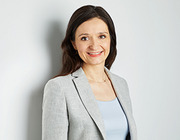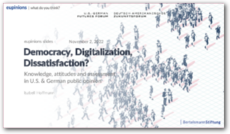The war against Ukraine, the energy crisis, high levels of inflation and the pandemic’s aftereffects all pose major challenges for people in Germany and the United States. The enduring state of crisis seems also to have undermined confidence in democracy’s capacity to function effectively. Only slightly more than half of Germany’s population (54%) say they are satisfied with the way democracy works in their home country. In March, this figure was 66%. This puts Germans very close to citizens of the United States, 55% of whom say they are satisfied with the functioning of their democratic system. Survey respondents in each country also express doubts that their current governments are capable of meeting today’s challenges. For example, less than half of the participants from Germany (47%) say they have confidence in the German government’s ability to address the day’s most pressing problems. According to a new eupinions survey, the Bertelsmann Stiftung’s public opinion poll instrument, the U.S. government performs only marginally better on this measure, with only 49% of U.S. citizens indicating that they are satisfied with the work of the U.S. government.

Martin Adams / Unsplash – Unsplash License, https://unsplash.com/license
One in two people in Germany and the United States want a better-functioning democracy
In both the U.S. and Germany, only a little more than half the population is satisfied with how democracy works in their country. Confidence in each government’s ability to solve current problems is similarly divided. There are clear differences in the way digital transformation is being handled. The results of the new eupinions survey will be pre-sented at the U.S.-German Futures Forum, which begins today on the sidelines of the G7 foreign ministers’ meeting in Münster.
Content
The results of the eupinions survey will be presented at the U.S.-German Futures Forum on November 2 and 3 in Münster. Organized by the U.S. State Department, the German Federal Foreign Office, the Bertelsmann Stiftung and the American Institute for Contemporary German Studies (AICGS), the forum is taking place on the sidelines of the G7 foreign ministers’ meeting. It brings together experts and early-career professionals from civil society, the business sector, academia and the two country’s governments with the goal of developing joint positions on the topics of democracy and digitalization.
"The goal of the U.S.-German Futures Forum is to emphasize the value of democracy in domestic and foreign policy by having experts from politics, the business and technology sectors, academia, and the media develop specific joint projects," says Ralph Heck, chair of the Bertelsmann Stiftung’s Executive Board.
Given the technological race with authoritarian systems, our democracies as a whole must become more sustainable and resilient. We at the Bertelsmann Stiftung are contributing to this goal with our research work, as well as by supporting this novel conference format.
Ralph Heck, chair of the Bertelsmann Stiftung's Executive Board
Joint appearance by Annalena Baerbock and Antony Blinken
"The foundation of democracy is still strong in Germany and the United States, but given the current pressures, we are starting to see some initial cracks. Policymakers must take this development seriously and show people that a democratic society is capable of managing the problems we face," says Isabell Hoffmann, a Europe expert and founder of eupinions. Cathryn Clüver Ashbrook, Europe expert at the Bertelsmann Stiftung, adds: "Change also produces stress. That’s why it is important that young people in particular from the U.S. and Germany exchange ideas and thoughts on how democracy can be strengthened – in part through the opportunities offered by technology. We hope to make a contribution to this with the Futures Forum."
The Futures Forum will be opened by the German ambassador to the United States, Emily Haber, and the U.S. ambassador to Germany, Amy Gutmann. In addition, political economist and transformation researcher Maja Göpel will discuss how our democracies can be steered through major social and economic change processes in such a way as to prepare them for the future. Following four workshops addressing the various challenges facing democratic societies today, Ralph Heck will discuss ideas for strengthening democracy. The highlight of the conference will be a joint appearance by German Foreign Minister Annalena Baerbock and U.S. Secretary of State Antony Blinken on November 3. This panel discussion on the topic of “Democracy and the Digital World – How Do We Create a Resilient Democracy?” will be moderated by ARD journalist Ingo Zamperoni. It will take place from 1 p.m. to 2 p.m., and will be available as a live stream online.
Digitalization is seen as an opportunity for democracy
Digital transformation poses a significant challenge to both U.S. and German democracy. However, the survey does reveal a striking difference in this area: While 91% of Germans claim to know what digitalization is, only half of those surveyed in the United States say the same. In neither the United States nor Germany do a majority of people perceive digitalization as a threat. Fully 70% of Germans and 77% of Americans reject this idea. Correspondingly, more than two-thirds of those surveyed say they think digitalization holds more opportunities than risks for democracy. Citizens of the United States (86%) and Germany (82%) are also largely similar in believing that digitalization has been good for them personally as well. However, around three-quarters of people think that the protection of privacy should be a political priority. "In general, two-thirds of Germans and Americans see digitalization in a positive light, though not for every aspect of digitalization," says Isabell Hoffmann. In both countries, just under half of all respondents say that social media has helped improve public debate.
Material
Additional information
The attitudes of Germans and Americans toward democracy and digitalization were surveyed by eupinions, the Bertelsmann Stiftung’s European opinion-research partner, in a September poll. The survey included 1,109 people in the United States and 1,831 in Germany.
For more information – including on the survey’s methodology – see: www.eupinions.eu




![[Translate to English:] Menschen, die zum Schutz vor Covid19 eine Makse tragen.](/fileadmin/files/_processed_/c/8/csm_702590682AdobeStock_392991580_KONZERN_ST-CC_46dbe7071e.jpg)


